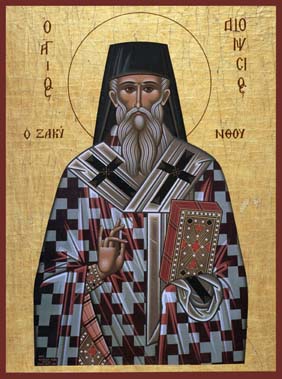St Dionysios of
Zakynthos
 St
Dionysios, a spiritual giant, seems to be among the living
through the miraculous preservation of his holy body. He was
born on the Greek island of Zakynthos in 1546 but whose
ancestry is traced back through the Venetian conquerors in a
family tree whose roots lay in part in Italy and in part
Normandy. Born into the ruling class at a time when Venice
was a dominant force in the area, Dionysios is said to have
been baptised into the Christian faith with the name
Draganinos by no less a godfather than Gerasimos of
Kephalonia, who was himself destined to become a venerated
saint of the Church.
St
Dionysios, a spiritual giant, seems to be among the living
through the miraculous preservation of his holy body. He was
born on the Greek island of Zakynthos in 1546 but whose
ancestry is traced back through the Venetian conquerors in a
family tree whose roots lay in part in Italy and in part
Normandy. Born into the ruling class at a time when Venice
was a dominant force in the area, Dionysios is said to have
been baptised into the Christian faith with the name
Draganinos by no less a godfather than Gerasimos of
Kephalonia, who was himself destined to become a venerated
saint of the Church.
Dionysios came of the royal household of the Venetians through his mother, but he led no one to believe - from childhood through maturity - that he was anything but a child of God. He formed lasting friendships with his fellow islanders from all walks of life.
He refused to take advantage of his social position other than to avail himself of a full education which brought out the power of his extraordinary intellect. By the time he was twenty-one he had not only established himself as a deep thinker and profound theological scholar, but has also mastered several languages.
With the encouragement of the entire population of the island, he set a course of service to Jesus Christ which was to bring him sainthood.
With the death of his parents, Dionysios entered the Monastery of Strophades, where he was in due course tonsured a monk with the name of Daniel. By the time that he was ordained priest in 1577, he was already a seasoned campaigner for Christ and was highly respected not only for his piety but also for his wisdom and beneficence. He had long since given his entire worldly goods to the poor and had earned a reputation for kindness and charity which had carried to the mainland among the clergy and laity alike.
On a mission to the Holy Land where Dionysios anticipated the exhilaration of walking where Jesus had trod, he stopped over in Piracus to book passage to Palestine but never completed his journey. Greeted warmly by church dignitaries, he was prevailed upon by Archbishop Nikanor of Athens to assume the episcopy of the island of Aegina, an appointment that was heartily approved by the Ecumenical Patriarch. In 1572 he assumed the post and with it the name of Dionysios. The saintliness of this prelate had been evidenced in many ways throughout his service to the Messiah, but as Archbishop it took on greater proportions. As a result he was sought out by pilgrims from all around seeking his blessing and benediction that seemed to produce true miracles. While he found these manifestations gratifying, he was overwhelmed by his immense popularity, and after much soul searching asked for and was given permission to return to the comparative tranquility of his native island.
Dionysios seemed to have the favour of the Lord and emerged from the seclusion of his monastic retreat from time to time to share this divine spark with his fellow Christians. He died peacefully at the age of seventy-five and reposes in the Church of Dionysios on the island of Zakynthos in the sparkling Ionian Sea.
from Orthodox Saints, v. 4,
by Fr George Poulos, Holy Cross Orthodox Press